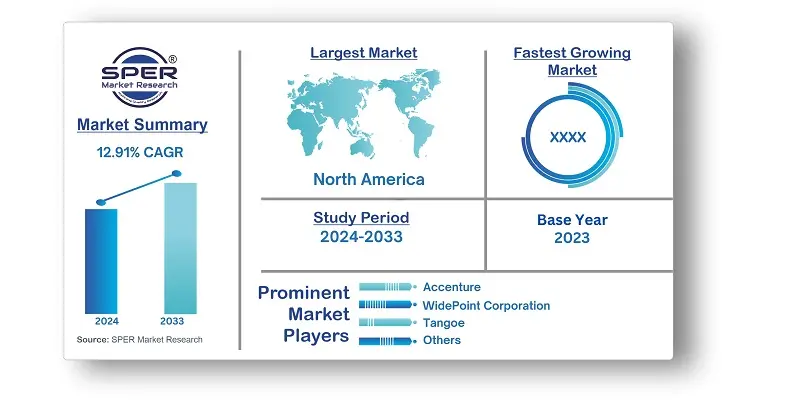
Telecom Expense Management Market Growth, Size, Trends, Demand, Share and Future Outlook
Telecom Expense Management Market Size- By Solution, By Service, By End User Industry- Regional Outlook, Competitive Strategies and Segment Forecast to 2033
| Published: May-2024 | Report ID: IACT2496 | Pages: 1 - 215 | Formats*: |
| Category : Information & Communications Technology | |||
- November 2023; British telecom behemoth Vodafone Group Plc collaborated with IT consulting firm Accenture to build a more efficient, commercially focused, and scaled organization.
- September 2023; With multiple clients utilizing CJC's vendor-agnostic expertise for consulting and integrating with the MDM solution—which includes data discovery, administration, and licensing management via the ILM product to construct a structured data source and cloud-based, hosted DACS for connectivity to external third parties, such as Calero—Crown Jewels Consultant Ltd. (CJC) has announced an improved collaboration with Calero (formerly Calero-MDSL).


| Report Metric | Details |
| Market size available for years | 2020-2033 |
| Base year considered | 2023 |
| Forecast period | 2024-2033 |
| Segments covered | By Solution, By Service, By End-User Industry |
| Regions covered | North America, Asia-Pacific, Latin America, Middle East & Africa and Europe |
| Companies Covered | Accenture, CGI Inc., WidePoint Corporation, Tangoe, Vodafone Group Plc, AVOTUS, Calero, Sakon, Upland Software, Inc., and TeleManagement Technologies, Inc., Control point solutions, Econocom and Others |
- Large Enterprises
- Small and Medium-Sized Businesses (SMBs)
- Government Agencies
- Educational Institutions
- Healthcare Organizations
- Retail Businesses
- Manufacturing Companies
- Non-Profit Organizations
- Remote Workers
- Mobile Device Management (MDM) Software Providers
| By Solution: |
|
| By Service: |
|
| By End-User Industry: |
|
- Global Telecom Expense Management Market Size (FY’2024-FY’2033)
- Overview of Global Telecom Expense Management Market
- Segmentation of Global Telecom Expense Management Market By Solution (Invoice Management, Sourcing Management, Business Management, Dispute Management)
- Segmentation of Global Telecom Expense Management Market By Service (Hosted Service, Managed Service)
- Segmentation of Global Telecom Expense Management Market By End-User Industry (BFSI, Consumer Goods and Retail, Manufacturing, IT and Telecom, Healthcare)
- Expansion Analysis of Global Telecom Expense Management Market
- Problems and Obstacles in Global Telecom Expense Management Market
- Competitive Landscape in the Global Telecom Expense Management Market
- Impact of COVID-19 and Demonetization on Global Telecom Expense Management Market
- Details on Current Investment in Global Telecom Expense Management Market
- Competitive Analysis of Global Telecom Expense Management Market
- Prominent Players in the Global Telecom Expense Management Market
- SWOT Analysis of Global Telecom Expense Management Market
- Global Telecom Expense Management Market Future Outlook and Projections (FY’2024-FY’2033)
- Recommendations from Analyst
1.1. Scope of the report1.2. Market segment analysis
2.1. Research data source2.1.1. Secondary Data2.1.2. Primary Data2.1.3. SPER’s internal database2.1.4. Premium insight from KOL’s2.2. Market size estimation2.2.1. Top-down and Bottom-up approach
2.3. Data triangulation
4.1. Driver, Restraint, Opportunity and Challenges analysis4.1.1. Drivers4.1.2. Restraints4.1.3. Opportunities4.1.4. Challenges4.2. COVID-19 Impacts of the Global Telecom Expense Management Market
5.1. SWOT Analysis5.1.1. Strengths5.1.2. Weaknesses5.1.3. Opportunities5.1.4. Threats5.2. PESTEL Analysis5.2.1. Political Landscape5.2.2. Economic Landscape5.2.3. Social Landscape5.2.4. Technological Landscape5.2.5. Environmental Landscape5.2.6. Legal Landscape5.3. PORTER’s Five Forces5.3.1. Bargaining power of suppliers5.3.2. Bargaining power of buyers5.3.3. Threat of Substitute5.3.4. Threat of new entrant5.3.5. Competitive rivalry5.4. Heat Map Analysis
6.1. Global Telecom Expense Management Market Manufacturing Base Distribution, Sales Area, Product Type6.2. Mergers & Acquisitions, Partnerships, Product Launch, and Collaboration in Global Telecom Expense Management Market
7.1. Global Telecom Expense Management Market Size, Share and Forecast, By Solution, 2020-20267.2. Global Telecom Expense Management Market Size, Share and Forecast, By Solution, 2027-20337.3. Invoice Management7.4. Sourcing Management7.5. Business Management7.6. Dispute Management
8.1. Global Telecom Expense Management Market Size, Share and Forecast, By Service, 2020-20268.2. Global Telecom Expense Management Market Size, Share and Forecast, By Service, 2027-20338.3. Hosted Service8.4. Managed Service
9.1. Global Telecom Expense Management Market Size, Share and Forecast, By End User Industry, 2020-20269.2. Global Telecom Expense Management Market Size, Share and Forecast, By End User Industry, 2027-20339.3. BFSI9.4. Consumer Goods and Retail9.5. Manufacturing9.6. IT and Telecom9.7. Healthcare
10.1. Global Telecom Expense Management Market Size and Market Share
11.1. Global Telecom Expense Management Market Size and Market Share By Region (2020-2026)11.2. Global Telecom Expense Management Market Size and Market Share By Region (2027-2033)
11.3. Asia-Pacific11.3.1. Australia11.3.2. China11.3.3. India11.3.4. Japan11.3.5. South Korea11.3.6. Rest of Asia-Pacific11.4. Europe11.4.1. France11.4.2. Germany11.4.3. Italy11.4.4. Spain11.4.5. United Kingdom11.4.6. Rest of Europe11.5. Middle East and Africa11.5.1. Kingdom of Saudi Arabia11.5.2. United Arab Emirates11.5.3. Qatar11.5.4. South Africa11.5.5. Egypt11.5.6. Morocco11.5.7. Nigeria11.5.8. Rest of Middle East & Africa11.6. North America11.6.1. Canada11.6.2. Mexico11.6.3. United States11.7. Latin America11.7.1. Argentina11.7.2. Brazil11.7.3. Rest of Latin America
12.1. Accenture12.1.1. Company details12.1.2. Financial outlook12.1.3. Product summary12.1.4. Recent developments12.2. CGI Inc.,12.2.1. Company details12.2.2. Financial outlook12.2.3. Product summary12.2.4. Recent developments12.3. WidePoint Corporation12.3.1. Company details12.3.2. Financial outlook12.3.3. Product summary12.3.4. Recent developments12.4. Tangoe12.4.1. Company details12.4.2. Financial outlook12.4.3. Product summary12.4.4. Recent developments12.5. Vodafone Group Plc12.5.1. Company details12.5.2. Financial outlook12.5.3. Product summary12.5.4. Recent developments12.6. AVOTUS12.6.1. Company details12.6.2. Financial outlook12.6.3. Product summary12.6.4. Recent developments12.7. Calero12.7.1. Company details12.7.2. Financial outlook12.7.3. Product summary12.7.4. Recent developments12.8. Sakon12.8.1. Company details12.8.2. Financial outlook12.8.3. Product summary12.8.4. Recent developments12.9. Upland Software Inc.12.9.1. Company details12.9.2. Financial outlook12.9.3. Product summary12.9.4. Recent developments12.10. TeleManagement Technologies, Inc.12.10.1. Company details12.10.2. Financial outlook12.10.3. Product summary12.10.4. Recent developments12.11. Others
SPER Market Research’s methodology uses great emphasis on primary research to ensure that the market intelligence insights are up to date, reliable and accurate. Primary interviews are done with players involved in each phase of a supply chain to analyze the market forecasting. The secondary research method is used to help you fully understand how the future markets and the spending patterns look likes.
The report is based on in-depth qualitative and quantitative analysis of the Product Market. The quantitative analysis involves the application of various projection and sampling techniques. The qualitative analysis involves primary interviews, surveys, and vendor briefings. The data gathered as a result of these processes are validated through experts opinion. Our research methodology entails an ideal mixture of primary and secondary initiatives.



Frequently Asked Questions About This Report
PLACE AN ORDER
Year End Discount
Sample Report
Pre-Purchase Inquiry
NEED CUSTOMIZATION?
Request CustomizationCALL OR EMAIL US
100% Secure Payment






Related Reports
Our Global Clients
Our data-driven insights have influenced the strategy of 200+ reputed companies across the globe.




















